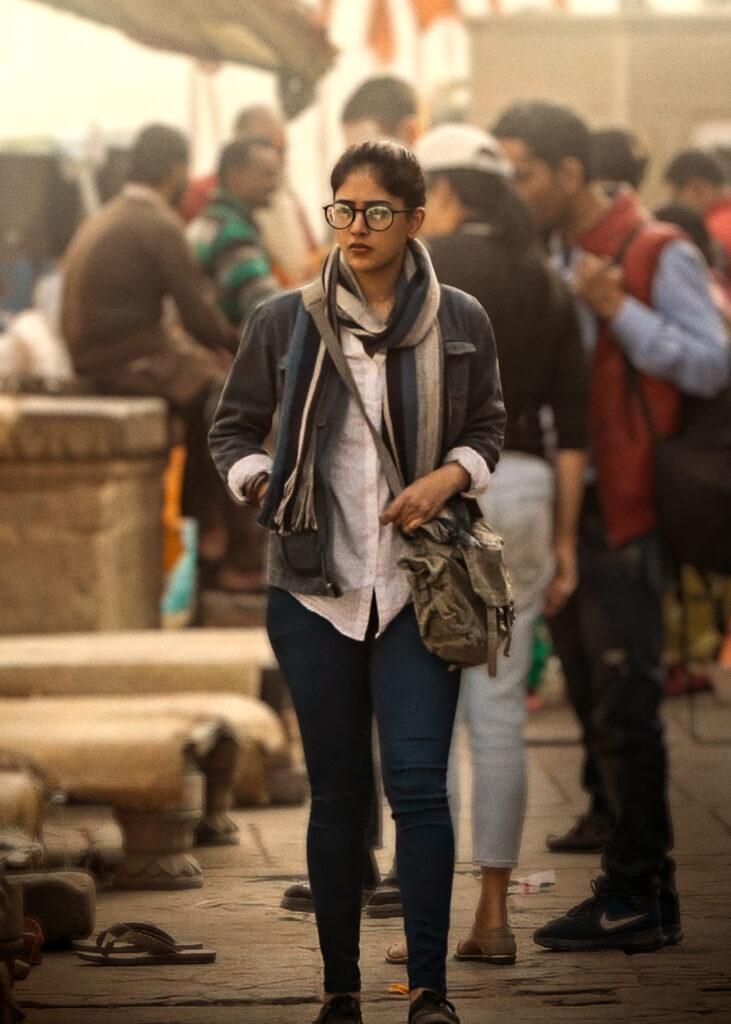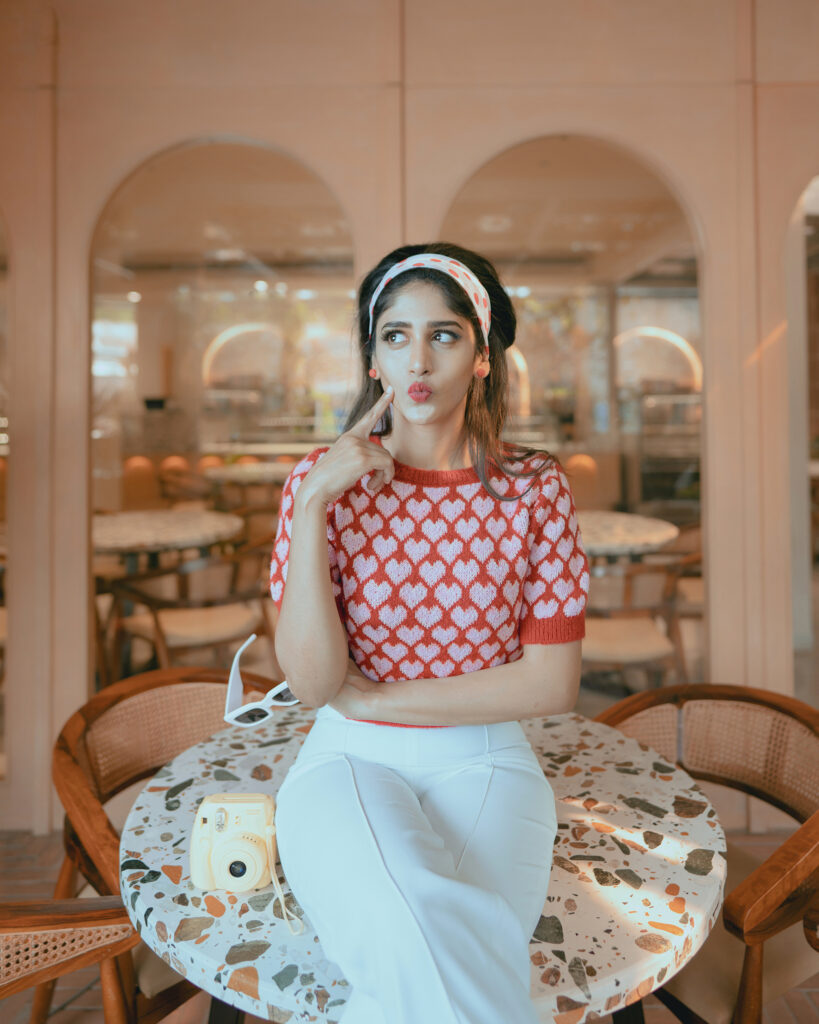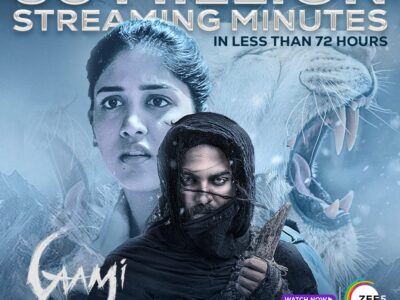Chandini Chowdary, who forayed into Tamil cinema with Saba Nayagan last year, will kickstart this year with her pet project – Gaami – this Friday. She has been associated with the Vidyadhar Kagita directorial for over six years and is mighty ‘proud’ of the way how it has shaped up. With multiple projects due for release in the coming months – Yevam, Music Shop Murthy and NBK 109, the actress is thrilled that her distinct choices over nine years have paid off.
In a chat with fridaywall.com‘s Srivathsan Nadadhur, Chandini offers readers a peek into Gaami and takes stock of her journey, while nearly completing a decade in films.
Orson Welles once said that ‘the enemy of art is the absence of limitations.’ Be it Manu, Colour Photo or Gaami now, have you thrived better under constraints?
I am not sure if it applies to every project. More than limitations, it boils down to our conviction in the story we’re trying to tell and it’s not my efforts alone. It depends on how all departments come together with a unified vision, putting their trust and hard work into a film. Even if one division doesn’t believe in the product fully, it reflects in the result and Gaami isn’t an easy film to make.
The filmmaking process was as adventurous as the film. The limitations surrounding the project were frustrating, we’ve been striving for perfection despite many roadblocks. It would’ve been easy for us to settle with something mediocre and release it earlier. Perhaps, the right time is now. Our director Vidyadhar recently said that the post-production process was an act of letting go.

An actor’s graph is often dependent on the projects that come their way and how directors/writers visualise you in a particular role. In that scenario, is it possible to ‘plan’ your filmography consciously?
In my case, it hasn’t worked that way. I did have a plan in place when I started my career, but I gradually realised I was trying to be someone else. I thought it was a safe bet to choose a particular type of project to be a popular actress – it didn’t work out for me. I was constantly dissatisfied and felt I was trying to please others.
As a film buff, the process fascinates me more, that drew me to the industry. I never chased fame. Beyond a point, I didn’t sense a need to fit in anymore. I had to be happy with myself and my work first. I kept all variables aside and trusted my gut instinct with projects. Regardless of its success/failure, I’m now a satisfied actress because I’m doing what I like.
Through Gaami’s promotions, people have realised that I am consciously trying to do different scripts. They can’t box me anymore. You can’t merely address me as just a Telugu-speaking actress now – I’ve done the song-dance routine, gone beyond films, ventured into web shows and tasted success and failures. You can’t ignore the fact that I’ve made progress.

Is it scary to work on films without any reference points, say Gaami?
It’s actually a joy to work on something without any reference point, it’s an open game. All you have to do as an actor is to follow the director’s vision, the toughest job is his – to create a new world. I knew Vidyadhar a year before we commenced work on Gaami. He’s a curious soul, practical and sensible, we had crazy conversations.
I already knew the other technicians because of our previous collaborations – Karthik Sabareesh, Naresh Kumaran et al. Vidyadhar always encouraged conversations and trusted that my perspective could add value to a scene. Jahnavi in Gaami or most of the roles in my career are extensions of my real-life persona and it helped me stay in control of my character trajectory without going astray.
Was it tough to find your footing in a mythical (Gaami’s) world that’s quite distant from reality?
Certain aspects in the film may seem out of the world and alienating, but a major part of the story (the segment dealing with my character) is relatable (though it may not have been showcased in the trailer). The Devadasi system is still a reality for many, for instance. There will be many surprises in store, but I assure you that Gaami will be believable.
Didn’t the harsh weather, scanty resources, and practical issues affect your performance?
I had no option but to rise above these limitations and still act, and do my job. Even when you trek at – 40 degrees, without sipping water/tea in the morning, you need to deliver. A crew of 15 people braved many challenges to be there and my primary duty was to not let them down. I can’t come this far and do something mediocre.
For an actress like me, it’s important that I prove myself with every project. I have come far from where I’ve started, yes, but for my career to progress further, I can’t afford to rest on my laurels and ensure that the film does the talking.

Much like Shankar in Gaami, is it scary to imagine life without physical touch?
Generally, if I grow fond of someone and friends who’re very dear to me, I’m a sucker for physical touch. When it’s a person whom I’m not yet familiar with, I don’t go as far as offering a hug too, even though social conventions suggest otherwise. Imagining a life without physical touch isn’t scary but if it is forever, I may not be able to function normally.
Gaami has been repeatedly dubbed as an ‘offbeat’ film, but the aim is to bring crowds to theatres to watch a not-so-usual story. Is it hard to promote such a product?
It is a challenge sans an iota of doubt. I identify myself as an artist more than a businessperson. I think people like me or Vidyadhar are ‘artsy’ kind of people – we don’t understand the business side of the world. The only aspect we’ve in our control is – to deliver a good performance and make a worthy film. How do you cater a product to a certain audience? I’m still trying to figure that out.
Even while Colour Photo was being made – not many of them believed in us and we were subjected to many off-handed jokes and remarks after release too. When I listened to the script, I felt I had to be a part of it and didn’t think of anything else. The National Award gave us all the validation we needed. I’ve made peace with the fact that I have no control over a response to a film – all I care for is the story and my character. Gaami is my pet project and you’ll know why I hold it close to my heart.
For those who’d be coming to watch Gaami, how would you describe Jahnavi?
An aspect that I’ve maintained in all my characters is that – she is a strong-willed woman, who’s not limited by social/physical norms. Unlike what people expect in most films, Jahnavi is not quite the support system in the male protagonist’s journey; she has her own identity and I’ve done my best to bring her internal strength to the fore.













